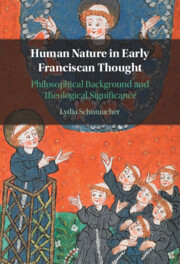46 results
3 - The Soul and the Body
-
- Book:
- Human Nature in Early Franciscan Thought
- Published online:
- 27 January 2023
- Print publication:
- 19 January 2023, pp 65-103
-
- Chapter
- Export citation
Introduction
-
- Book:
- Human Nature in Early Franciscan Thought
- Published online:
- 27 January 2023
- Print publication:
- 19 January 2023, pp 1-11
-
- Chapter
- Export citation
Index
-
- Book:
- Human Nature in Early Franciscan Thought
- Published online:
- 27 January 2023
- Print publication:
- 19 January 2023, pp 335-344
-
- Chapter
- Export citation
12 - Conclusion
-
- Book:
- Human Nature in Early Franciscan Thought
- Published online:
- 27 January 2023
- Print publication:
- 19 January 2023, pp 285-308
-
- Chapter
- Export citation
11 - Angels
-
- Book:
- Human Nature in Early Franciscan Thought
- Published online:
- 27 January 2023
- Print publication:
- 19 January 2023, pp 276-284
-
- Chapter
- Export citation
9 - The Affections
-
- Book:
- Human Nature in Early Franciscan Thought
- Published online:
- 27 January 2023
- Print publication:
- 19 January 2023, pp 228-248
-
- Chapter
- Export citation
8 - Cognitive Powers
-
- Book:
- Human Nature in Early Franciscan Thought
- Published online:
- 27 January 2023
- Print publication:
- 19 January 2023, pp 205-227
-
- Chapter
- Export citation
7 - The Reception of Averroes in Early Scholasticism
-
- Book:
- Human Nature in Early Franciscan Thought
- Published online:
- 27 January 2023
- Print publication:
- 19 January 2023, pp 182-204
-
- Chapter
- Export citation
5 - Cognitive Powers
-
- Book:
- Human Nature in Early Franciscan Thought
- Published online:
- 27 January 2023
- Print publication:
- 19 January 2023, pp 129-165
-
- Chapter
- Export citation
Key to Summa Halensis Citations
-
- Book:
- Human Nature in Early Franciscan Thought
- Published online:
- 27 January 2023
- Print publication:
- 19 January 2023, pp xiii-xiv
-
- Chapter
- Export citation
Dedication
-
- Book:
- Human Nature in Early Franciscan Thought
- Published online:
- 27 January 2023
- Print publication:
- 19 January 2023, pp v-vi
-
- Chapter
- Export citation
Bibliography
-
- Book:
- Human Nature in Early Franciscan Thought
- Published online:
- 27 January 2023
- Print publication:
- 19 January 2023, pp 309-334
-
- Chapter
- Export citation
6 - Cognitive Powers in John of La Rochelle’s Summa de anima
-
- Book:
- Human Nature in Early Franciscan Thought
- Published online:
- 27 January 2023
- Print publication:
- 19 January 2023, pp 166-181
-
- Chapter
- Export citation
10 - Free Choice
-
- Book:
- Human Nature in Early Franciscan Thought
- Published online:
- 27 January 2023
- Print publication:
- 19 January 2023, pp 249-275
-
- Chapter
- Export citation
Copyright page
-
- Book:
- Human Nature in Early Franciscan Thought
- Published online:
- 27 January 2023
- Print publication:
- 19 January 2023, pp iv-iv
-
- Chapter
- Export citation
List of Abbreviations
-
- Book:
- Human Nature in Early Franciscan Thought
- Published online:
- 27 January 2023
- Print publication:
- 19 January 2023, pp xv-xvi
-
- Chapter
- Export citation
4 - The Powers of the Soul
-
- Book:
- Human Nature in Early Franciscan Thought
- Published online:
- 27 January 2023
- Print publication:
- 19 January 2023, pp 104-128
-
- Chapter
- Export citation
Acknowledgements
-
- Book:
- Human Nature in Early Franciscan Thought
- Published online:
- 27 January 2023
- Print publication:
- 19 January 2023, pp xi-xii
-
- Chapter
- Export citation
2 - Theological Background
-
- Book:
- Human Nature in Early Franciscan Thought
- Published online:
- 27 January 2023
- Print publication:
- 19 January 2023, pp 42-64
-
- Chapter
- Export citation

Human Nature in Early Franciscan Thought
- Philosophical Background and Theological Significance
-
- Published online:
- 27 January 2023
- Print publication:
- 19 January 2023



